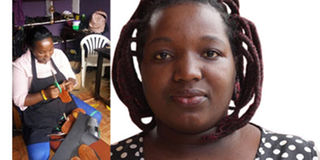Making shoes for a living

From making her first pair of shoes in 2016, Rosette Twezirimana has sold many pairs and established Tandika Uganda, which teaches people how to make shoes. Photos/Joan Salmon.
What you need to know:
In 2016, after writing and delivering more than 100 application letters to different organisations, Rosette Twizerimana resolved not to waste any more money. Although the start is always challenging, she was determined to be a job creator.
When we graduate, we embark on an endless search for jobs, writing application letters and polishing resumes. And while some are lucky to get the job of their dreams, others settle for any available job, as long as they can make ends meet.
After completing a Diploma in Accountancy from YMCA, Rosette Twizerimana’s attempts at getting good jobs were in vain. Although she worked as a cashier at some point, what she earned was not enough to facilitate her to work.
In 2016, after writing and delivering more than 100 application letters to different organisations and spending lots of money on printing and transport, Twizerimana resolved to change the strategy.
“Job searching is a hectic venture. For many of these organisations where I dropped my application letters, not even a phone call or an email came through with feedback. Some employers are shameless. They ask for outings and sex in exchange for jobs. At this point, I decided that enough was enough,” she says.
On a random day, after buying a pair of African sandals from Masai traders in Kampala, Twizerimana thought this was something she would do. “I used a friend’s computer to learn about shoemaking. He also introduced me to YouTube videos,” she says.
She used Shs100,000 from her savings to buy some leather, thread, a needle and sandpaper for a start. “When I made the first pair of shoes, I searched for an organisation, Sawa World, to polish my skills. ”
Her first shoes were poorly done, but she was happy with the progress. Although she could not put these on the market, she continued to experiment with various ideas and designs. It is this resilience that propelled her to perfect the art and six months later, she had good quality products on the market, ready for sale.
The training covered introduction to tools and materials, shoe design, basic shoe construction, lasting, cutting and sewing, shoe sizing and shoe styles, finishing and embellishments, pricing as well as procurement of materials.
During an annual exhibition, she was given an opportunity to showcase her work and from here, she got her first client, who paid her Shs100,000 to teach her the same skill.
Twizerimana also got an opportunity to train five women from her church from whom she got Shs600,000. For two years, she used her verandah as her workshop and work was done manually. Her breakthrough came in 2017, when she got a contract to train women and youth in Sheema District. She was paid Shs600,000 for a two-day event. This was enough for her takeoff.
With that, Tandika Uganda was ready to start. Today, she employs people to work in the production and marketing departments of Tandika Academy. Twizerimana markets her products via social media.
“Tandika Uganda offers basic shoemaking skills without the use of complicated and heavy machinery. This equips girls and women with the skills to start their own shoemaking cottage industries,” she says. Individual training costs Shs290,000 for two weeks, while groups will part with Shs150,000 per person for three days. However, the academy occasionally sponsors some people to learn for free or at a discounted rate.
Through the years, Twizerimana acknowledges the mentorhship of Geoffrey Ekongoti. “He is my partner in this business. He not only believed in me, he also held my hand to see my dream come to life,” she says.
Today, her business cum academy has grown tremendously and she sources materials from Nairobi, Kenya. Her shoes cost between Shs20,000 and Shs30,000. But not all has been rosy for this startup, considering that she has had a fair share of challenges. These include limited operating space, understaffing, low operating capital and limited machinery for production.
“As the orders started to trickle in, the need for faster production arose. That’s why we needed to invest in automation. For example, we need machines to stamp cut soles faster, cut straps and leather automatically, in order to increase speed, consistence and precision,” she says.
Together with her team, they are working hard to increase their production with the available machinery to create enough cash reserves to acquire bigger working space.
Twizerimana is also hoping to raise more capital to enable them expand their team and capital assets. Not all is gloom in this business journey as she shares some remarkable victories. “We were selected to participate in the Mandela Washington Fellowship 2019 in the US. It was a great experience to interact and learn from entrepreneurs across the globe,” she says.
Tandika Academy was also selected to participate in African Women Entrepreneurship Cooperative, a training that provided many networking opportunities from women entrepreneurs across the continent. The programme that lasted 12 months, also came with entrepreneurial skills, that are boosting Twizerimana’s shoe business.
Twizerimana also has a budding desire to empower young girls and women. She has so far trained more than 300 women and girls, which gives her satisfaction that she has made a positive impact on society.
Women groups that have benefited from her academy include Sheema youth and women groups; Droha Uganda in Bugembe, Jinja, Egoli Africa in Kamuli; Sawa World in Kikoni Makerere and Czech Caritus in Buikwe.





